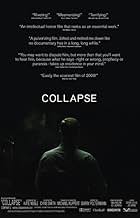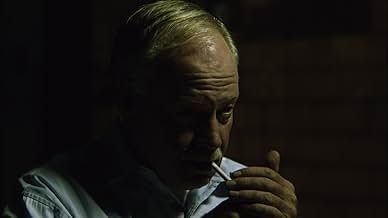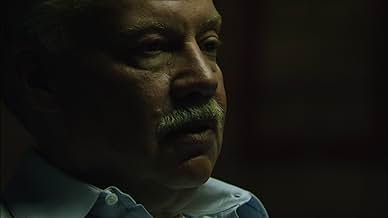Agrega una trama en tu idiomaA documentary on Michael Ruppert, a police officer turned independent reporter who predicted the current financial crisis in his self-published newsletter, From the Wilderness.A documentary on Michael Ruppert, a police officer turned independent reporter who predicted the current financial crisis in his self-published newsletter, From the Wilderness.A documentary on Michael Ruppert, a police officer turned independent reporter who predicted the current financial crisis in his self-published newsletter, From the Wilderness.
- Dirección
- Guionista
- Elenco
- Dirección
- Guionista
- Todo el elenco y el equipo
- Producción, taquilla y más en IMDbPro
Opiniones destacadas
Ruppert hits us right away with peak oil, arguing that though actual supplies have been kept hidden by governments, even Saudi Arabia, which has more than anybody, is starting to run out, and we're clearly now on the down slope of the bell curve. He says no substitute will really work, because all the alternative energy sources require too much energy themselves to produce. The planet's infrastructure is going to shut down; it's just a matter of time. Parallel to this is economic collapse, and he predicted the present crisis -- but expected it a year or so earlier. (Mighn't he be jumping the gun a little on this larger collapse?)
Ruppert is a survivalist, warning us all to live locally. He compares the fates of North Korea vs. Cuba when they lost the Soviet oil lifeline: Korea, a monolithic dictatorship, took a terrible hit. So did Cuba, but people pulled together there, raised crops locally in every available spot of land, and soldiered through so well they're now eating better than ever. He would have us take the same route: raise our own food, and horde gold -- the actual metal, not paper certificates -- and organic seeds, which in a world stripped of supply will become currency.
Ruppert is a smoker, and Smith doesn't hesitate to show every time he lights up. This looks like a marathon, and the interview -- with challenging, skeptical questions off camera from the director from time to time, not that this overconfident autodidact type ever wavers -- is so intense Ruppert actually breaks down and weeps more than once at the hopelessness of it all.
Smith's film is effective, and if it leaves you in some doubt whether the man is a kook or a visionary maybe that's part of the sense of radical unease you may justifiably feel walking out of the theater. Though Ruppert is made to seem both knowing and deranged, his talk is smart and well-informed. Clearly fossil fuels are finite. It all depends on transportation; it all depends on electricity. Without oil, these shut down. If seven gallons of oil go into the making of every tire, how are we going to make a whole new set of cars that run on something else? What about plastics? What about overpopulation? Ethanol is a sick joke, clean coal a lie. Even wind and solar power won't be possible because we won't have the energy to set up the power sources to utilize them. Global warming is just the planet's way of crying "uncle." When oil runs out, we'd better be ready before the infrastructures all collapse, or it's going to be hard going. We've got to downsize. It won't be easy.
It's rare that anybody thinks things through this far. No wonder the tears come. They come when he thinks of Barack Obama, a smart, good, honest man, he says, but someone so locked into the systems that we can't look to him for help. And that's very, very sad. The world's last, best hope is an illusion. (These are just a few of Ruppert's points: into these 82 minutes he condenses the fruits of decades of independent thought and study.)
Smith asks Ruppert what spiritual beliefs sustain him and he simply quotes the Bible: "money is the root of all evil." He asserts that we must find ways to live without growth and profit as guiding motives. The pervasive pursuit of money is the great, tragic human flaw.
This is an intensified and distilled Michael Ruppert, very effective but a bit misleading: he has other facets. In another setting glimpsed in the film but available in full on YouTube you can see Ruppert in a suit and tie giving a rambling, self-indulgent slide lecture full of many of the same interesting facts he likes to cite, including the government's reliance on drug trading, but very different in feeling and veering (though he denies this elsewhere) into 9/11 Truth territory. Collapse ends with captions noting that Ruppert, whose only friend seems to be his faithful dog, is having trouble paying his rent and may be evicted from his Culver City place.
But again on YouTube you find him being interviewed recently in Oregon, where he has moved, looking and sounding sunny and grounded and socially connected. If he's a kook, he has lots of friends, some of them quite respectable, and "Peak Oil" is a rallying cry for many. The YouTube videos show Ruppert isn't always the intense nut case Smith gives us. He suffers, he thinks too much, but he can have fun; he can talk without a smoke. He feels Ashland is a place among many (including much of South America) where sustainability will be possible when the paradigm shift comes. The end of he world won't be the end of the world. This may not totally convince you, but it will scare you. Rupert protests in Smith's movie that he deals in conspiracy facts, not conspiracy theories. He just may be right.
All of his concerns are true, and some are even worse than he stated, but the very worst problem of all didn't even get a mention from him....that of global overpopulation that is the root cause of all the symptoms of our existence troubles that he did state.
To simplify......if the world's population was 20% of what it is now, the maximum sustainable figure, all of Ruppert's concerns for human existence would not be crucial for thousands more years when real solutions to the problems he stated might be available. But, we cry about the symptoms and don't care one bit about the cause so we continue to overpopulate all countries with uncontrolled new births, and are continually overburdened with resultant and mostly unsolvable problems as a result. Air, water, oil, food, and every single other problem of today that Ruppert stated has been caused by overpopulation, but still we cry only about symptoms, as Ruppert does, instead of the root cause of all our global problems....too many people being born with no controls on it and, what is much worse, no gov't or societal thought even being given to it.
As a result of that typical human stupidity and shortsightedness we are done, people, it is just a matter of time, and not that much time either, as your own young grandchildren will suffer badly as a result. But, still you don't care, so nothing is ever done about it. We don't deserve any more time on earth if we don't even care enough about protecting our continued existence by working on the cause of all of our problems.
Collapse is an amazing documentary that works on several levels. We'll start with the first: Ruppert's analysis of the world around us is stunningly bleak. Our entire civilization is based on oil. This is fact. All transportation requires oil in some form. All manufacturing (and civilization as we know it) is based on energy, which is finite, and requires some oil in some form. Building the resources to harvest ANY energy source requires manufacturing and transportation, which requires oil. Cultivating food requires energy to produce and transportation to get to your grocery store or home. Even if we discover some new energy source - algae, for example, which is not addressed in the film - all the components needed to harvest or utilize that energy are oil-based. Even if we invent cars without tires (which require 8+ barrels of oil to make, PER TIRE), the plastics and metals and components in those vehicles all require oil as either a direct ingredient or as an indirect part of the manufacturing.
Now imagine a world without oil. See where this is going?
This film, and Ruppert, go much further than that. Oil dependency is just the appetizer. Then we get to Peak Oil (or the Hubbert Peak). Then an economy based on floated, imaginary, (fiat) money. And so on. Ruppert builds his case with hysterically grim anecdotes and considerable authenticity. It's difficult to disagree with him precisely because he doesn't allow 'theory' or partisan/ideological opinion to seep into the discussion. The facts are accurate. The conclusions... are up to you.
Let's talk about the film-making itself: Chris Smith's film is shot 'bunker-style' for effect. It works. There are hardly any miscues in the technical aspects, and the editing style is absolutely riveting and never boring. As pure entertainment, if we can call it that, this film will absolutely command your attention for 80 minutes. The film does not subscribe - one way or another - to Ruppert. It just shows him as he is and allows you to draw your own conclusions. Right or wrong, Ruppert's quest to seek this knowledge and tell it to the world has subtly destroyed him. Collapse works on an intensely personal level, too. This film burns itself into the mind. It's point blank brilliant.
Others have noted a major flaw in Ruppert's arguments, including the filmmaker himself: Ruppert does not allow for miracles or human ingenuity in his apocalyptic scenarios. Ruppert has already decided we've passed the point of no return and is now looking to "build the lifeboat on the Titanic". When confronted about this directly, Ruppert's non-answer more or less says that he won't trust his fellow humans to think a way out of this. Ruppert has so expertly identified the problems, but he has no answers. All his "hope" is directed at ways to survive what's to come. Again, right or wrong, this man absolutely believes what he's saying and is absolutely terrified. You should be, too.
What's the way out? Well, I personally choose to believe the first part of Ruppert's argument and disregard the second. We are in trouble. But I choose to have faith in my fellow man, that we can "fix the Titanic" before it's too late. In the meantime, you must see this film. See it, soak it in, let it shake you, and tell your friends. Draw your own conclusions. Ruppert's role is to sound the warning. Perhaps if enough people see this film, someone out there will figure out what to do.
Essentially what this film does is the equivalent of getting stuck at a bus stop listening to a guy who is convinced that the world is going to come to an end and that "they" are just keeping us in the dark for some reason. I don't mean this as negatively as it sounds but it is fair to say that this film doesn't hide the fact that at times Ruppert gets carried away with himself, doesn't always cope well with having the totally open stage that he has in the interview, gets passionate, is obsessive and does happen to make statements that (out of context) come off as paranoid and doomsday in nature. It is also fair to say that, unless you already share his mindset, that there will be several times during the film where he goes further than you will be willing to go or says things that either don't make sense, seem like a stretch or that you just plain disagree with.
Mostly the film lets him talk so it is only fair that these moments are left in the film because it does let us see that, being frank, Ruppert is obsessive and that perhaps some of what he says is exaggerated and extreme but this is not to say that he is 100% wrong. So while I personally don't agree with him on the imminent nature of the collapse of the oil reserves (or that they are significantly smaller than "they" are telling us), one cannot really argue that from plastics to fuel, we really have put all our eggs into the "oil" basket and that supplies are simply not infinite. Likewise, because all of our eggs are in one place, moving them may well be possible in small numbers but if we suddenly have no basket – we're going to have a load of broken eggs. At this level the film is engaging and provides plenty to think about and I think that Ruppert is at his best when he is talking generally because his basic points are hard to argue; it is only when he gets into specifics or gets tied up in details that he begins to say "they" too often or get a bit more emotional.
These moments hurt the film by hurting him, although in fairness since the documentary is technically about him, then it is all part of the film and is a good bit of balance. So yes, Collapse will lose you at some point but it will also engage you at many more; it isn't the most factual of documentaries nor is it the best in terms of structure but I found it mostly very engaging and it sent me onto news sites and opinion sites on the internet to read up on some of the less "opinion" related "facts" that it Ruppert presents. Worth seeing for its faults because it is engaging and provides much to think about, even if your conclusions may not lie as far out there as Ruppert's.
But the real element that grabs you is Smith's subject. Ruppert will be seen by some as a prophet and by others as a nutcase but he has a magnetism on screen that is undeniable. This ex-cop is well-spoken it is very obvious that he has given conferences and presentations as he begins to explain his theories.
The main point Ruppert is trying to get across is undeniable. Our planet has finite resources which will not be able to sustain our current way of life indefinitely. But Ruppert's actual discourse will never be confused with a green activist as he veers constantly into subjects such as peak oil, politicians and banks. Where Ruppert is more questionable is when he mixes opinions with facts.
Ruppert repeats that he is not a conspiracy theorist yet often acts like ones. He constantly cites people, studies and historic events that favors his point of views and ignores the rest. These are old techniques that have been used by countless gurus, theorists and leaders and Ruppert does it very effectively.
This mix of truth and speculation works because the part that is truth is monumentally percussive: We as a species will not be able to live this way forever.
Ruppert posits that the system is crashing down fast but you don't have to believe this to enjoy this documentary. He interprets all sorts of world events as symptoms and yet again, you can take it or leave it. He claims he has been shot at and that US presidents have taken a personal interest in him without offering any evidence and you can discard this. He makes a compelling argument that alternative energies we are exploring are not sustainable/viable in their actual form but you can choose to disagree. He lashes at the deficiencies of globalization and you could ignore that too.
What you can't ignore is that change will have to happen. Smith seems confident that the audience will make up their minds about Ruppert and his theories. You do not have to share Ruppert's quasi-apocalyptic vision of the future to have a great time watching this.
Despite the praise, Collapse is not without a few flaws. I wished more time had been devoted to questioning Ruppert's wilder claims. Shot at? When? Where? Who? I also thought Ruppert's angle was too focused on the US and would have loved to hear his opinion on China and a few other things.
But overall, this is a nice documentary with an air of political thriller to it. Whether it is academic or objective, is left for each viewer to decide.
¿Sabías que…?
- TriviaAccording to director, Chris Smith, they initially agreed the primary subject was supposed to be the CIA's connections to drug smuggling within the Iran-Contra affair, specifically Ruppert's collaboration with Pulitzer Prize-winning reporter Gary Webb's mid-1990's investigative series, "Dark Alliance." But Ruppert didn't want to talk about the CIA. Instead, he wanted to talk about peak oil, and its critical implications for the future.
- Citas
Michael Ruppert: It's kind of sad because we as a species have become so disconnected from the Earth. We don't have any real contact with the Earth. We don't have any sense of its functions, its feeling, its seasons, its timings.
- ConexionesReferenced in Film Junk Podcast: Episode 235: TIFF Report, Part 1 (2009)
- Bandas sonorasCollapse
Performed by Karli Larsen, Didier Leplae, Joe Wong
Selecciones populares
- How long is Collapse?Con tecnología de Alexa
Detalles
Taquilla
- Total en EE. UU. y Canadá
- USD 46,964
- Fin de semana de estreno en EE. UU. y Canadá
- USD 7,800
- 8 nov 2009
- Total a nivel mundial
- USD 46,964
- Tiempo de ejecución
- 1h 22min(82 min)
- Color


















